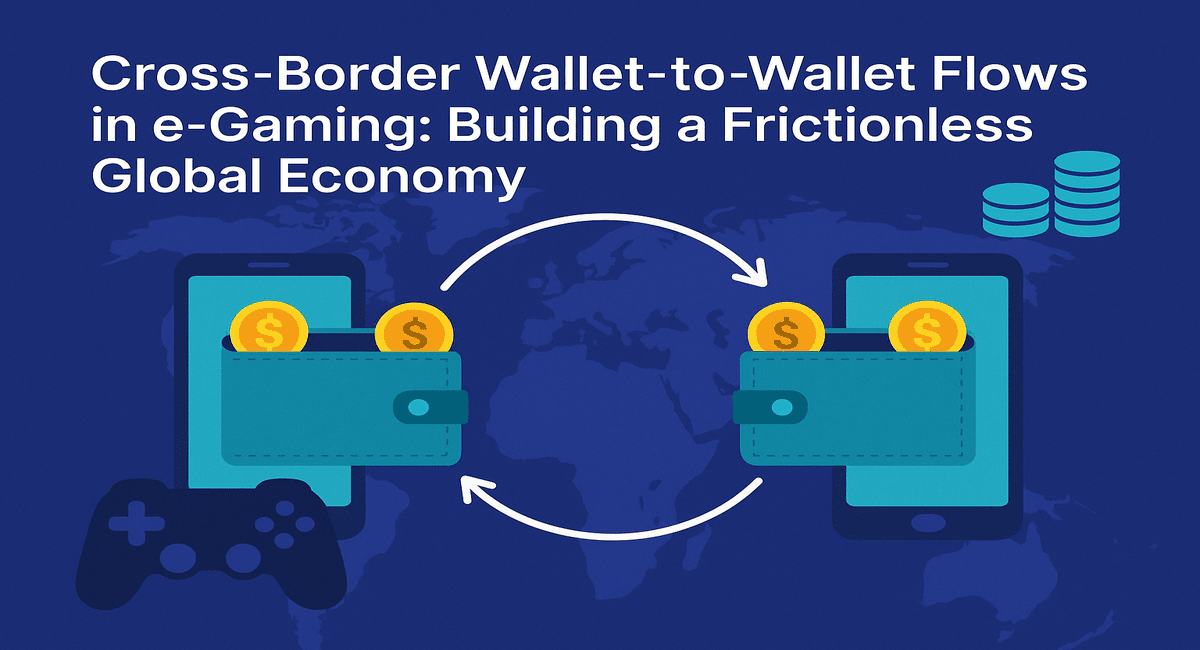
Cross‑Border Wallet‑to‑Wallet Flows in e‑Gaming: Building a Frictionless Global Economy

In the rapidly expanding digital gaming world, Cross‑Border Wallet‑to‑Wallet Flows in e-gaming are driving the next big transformation. These decentralized, instant transfers allow players, developers, and creators to exchange value globally without intermediaries, delays, or high fees.
As blockchain and cryptocurrency adoption continue to grow, this innovative system is becoming essential to building a truly global, frictionless e-gaming economy.
What Are Cross‑Border Wallet‑to‑Wallet Flows?
Cross-border wallet-to-wallet flows refer to cryptocurrency transfers between digital wallets across countries. These transfers operate on blockchain networks, enabling direct peer-to-peer exchanges without banks or centralized processors.
In e-gaming, this means players can:
Trade assets like NFTs or skins instantly.
Receive international tournament payouts.
Buy or sell in-game items across borders.
Support global streamers or content creators with micro-donations.
Why It’s a Game-Changer for e-Gaming
Traditional payment systems are slow, expensive, and often restricted by local regulations. Cross-border wallet transfers solve this by offering:
Instant value transfer (seconds, not days).
Lower transaction fees, especially for microtransactions.
Global accessibility, regardless of banking infrastructure.
24/7 availability without approval delays.
Gaming is no longer regional. Global user bases demand real-time transactions, and wallet-to-wallet solutions meet that need.
Key Technologies Enabling Wallet-to-Wallet Flows
The following technologies make cross-border wallet flows possible:
1. Blockchain Networks
Ethereum, Polygon, Solana, and BNB Smart Chain enable smart contracts and decentralized asset transfers.
2. Stablecoins
Cryptocurrencies like USDT and USDC are pegged to the U.S. dollar, reducing volatility while maintaining blockchain benefits.
3. Crypto Wallets
Popular options include MetaMask, Trust Wallet, and game-specific wallets like Xsolla.
These wallets store digital assets and allow seamless, secure transfers between players.
4. Smart Contracts
Automate in-game payouts, trade mechanics, rewards, and royalty distribution without manual intervention.
Current Trends and Global Adoption
The use of Cross‑Border Wallet‑to‑Wallet Flows in e‑Gaming is growing rapidly. Consider these market figures:
$32 trillion in stablecoin volume was recorded in 2024, with $6 trillion used for payments.
Global gaming revenue exceeded $180 billion in 2024, with blockchain adoption rising fast.
Over 10% of esports prize pools are now being distributed via crypto wallets.
This shift is not just theoretical. It’s already reshaping how value moves in global gaming.
Real-World Use Cases
Peer-to-Peer Trades
Players trade NFTs, weapons, avatars, and skins directly, without centralized game markets or intermediaries.
Prize Payouts
Tournaments and esports platforms pay winners instantly in crypto, eliminating cross-border banking delays.
Creator Economy
Gamers and influencers can receive international donations or royalties through wallet-based micropayments.
Cross-Border Marketplaces
Platforms like OpenSea enable direct digital item exchanges using wallet integrations.
Benefits for Developers, Players, and Platforms
The frictionless nature of wallet flows offers measurable benefits:
Faster Payments: Streamline prize distribution, affiliate commissions, and royalties.
Reduced Fees: Avoid costly cross-border transactions and FX charges.
Increased Retention: Instant rewards increase player satisfaction.
Expanded Reach: Players and creators from underserved markets can easily participate.
Programmable Logic: Use smart contracts to create in-game economies, referral systems, and DAOs.
Challenges Holding Back Wider Adoption
Despite strong momentum, several challenges remain:
1. Regulatory Uncertainty
Crypto laws vary by country. KYC/AML requirements are difficult to standardize across platforms.
2. User Experience
Wallets can be confusing for casual players. Seed phrases, gas fees, and blockchain errors discourage adoption.
3. Volatility
While stablecoins solve this, many games still rely on volatile tokens.
4. Network Fees and Speed
High gas fees on Ethereum can hinder small payments. Layer-2 solutions like Polygon help but require integration.
5. Interoperability
Assets minted on one blockchain may not transfer easily to another, limiting player flexibility.
Emerging Solutions and Innovations
To overcome these challenges, developers and platforms are turning to:
Embedded wallets that don’t require complex setups.
Layer 2 chains (e.g., Polygon, Immutable) for cheap, fast transactions.
Cross-chain bridges for asset portability.
Regulatory-compliant APIs like SDK.finance and AstroPay for KYC-ready onboarding.
mBridge and other public-private partnerships to enable CBDC-backed cross-border flows.
Case Studies in the Gaming World
Xsolla Wallet
Designed for the gaming ecosystem, Xsolla’s wallet supports global payments, in-game assets, and crypto transactions in one unified interface.
AstroPay
A multicurrency digital wallet popular in Asia and LATAM, AstroPay integrates crypto rails with localized KYC systems—ideal for cross-border gaming.
SDK.finance
This platform allows studios to build their own wallet infrastructure, enabling wallet-to-wallet flows and NFT payments within their games.
The Road Ahead: Trends to Watch
Looking forward, we’ll likely see:
Wider use of regulated stablecoins like PayPal’s PYUSD or USDC for gaming payouts.
Wallet-native games where players connect their wallets to play and earn.
Cross-chain NFT economies enable assets to travel across games.
Integration of digital identity solutions for secure, compliant wallet access.
These innovations will make wallet-based flows not only more accessible but also more secure and universal.
Economic Impact on Global e-Gaming
By enabling unrestricted, direct value exchange, Cross‑Border Wallet‑to‑Wallet Flows in e‑Gaming are breaking down economic and geographic barriers. Independent game creators in emerging markets can reach global audiences. Players in underbanked regions can finally participate in real gaming economies.
This decentralization levels the playing field, creating a borderless environment where talent, creativity, and strategy are all that matter.
Conclusion
The rise of Cross‑Border Wallet‑to‑Wallet Flows in E‑Gaming signals a major shift toward a truly global, efficient, and user-centric gaming economy. As technology matures and adoption spreads, the friction that once held back international collaboration in gaming is disappearing.
Developers who integrate wallet-based solutions today will be best positioned to lead the next era of digital gaming. And players worldwide will benefit from a more inclusive, rewarding, and transparent ecosystem.
Ready to Join the Future of Gaming?
Whether you’re a developer, gamer, or investor, it's time to tap into the power of cross-border wallet transfers.
Start building the future with BuyUcoin. Sign up with BuyUcoin—India’s most trusted and secure crypto exchange. Buy, hold, and trade crypto with ease, and get instant access to stablecoins and wallet integrations perfect for global e‑gaming. Contact us today or Email us.